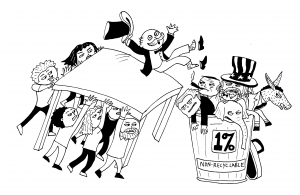Jun
10
2013

Controversial blogger Milo Yiannopoulous recently criticised the Sharing Economy concept, blaming it for damaging free markets (amongst other things). Here’s a debate I feel strongly about.
I left a career in finance to found StreetLend (a neighbourly rental website), and as a free market believer, let me address some of Milo’s points. Firstly:
How the sharing economy creates value
Take the example of a drill. On average, used for just twelve minutes in it’s entire lifespan. Capitalism (“the efficient allocation of capital”) isn’t about buying things that gather dust. It’s more efficient to buy the tools we need to own, and rent the rest.
A ladder has to be stored, which has an impact on the price the buyer is willing to pay. The ladder’s ability to earn money through lending adds value to the ladder. In both cases, the sharing economy raises the value of items in the primary economy.
Popular items within the sharing economy – tools, bikes etc are all things that depreciate. Why buy things that depreciate, when we could rent them and put the saved money into assets that appreciate in value, like our houses?
By lending we’re buying less. How can that be good for the economy?
In a country like the UK where we import more than we export, consuming less is actually good for our national economy. The UK currently imports about £100bn more in goods than it exports. This huge trade deficit means money is being invested abroad rather than here in the UK, and foreign holdings of the pound are high, potentially destabilising its value.
A lot of things we use were designed in America, manufactured in China, and imported. Importing means selling the pound on the currency markets and buying yuan / dollars (in order that American and Chinese companies can be paid). Selling the pound devalues it. So whenever we import goods to the UK we devalue the pound, which makes subsequent imports more expensive. It also means our wealth pays tax in other countries.
By consuming less and re-focussing on producing goods and services that other people want we’re rebalancing. Home shopfronts online (Etsy, Shopify, eBay etc), the peer-to-peer service industry (TaskRabbit, Zaarly etc) and the maker movement means that everyone can become a national exporter, and play their small part in reducing the UK’s £100bn trade deficit.
Does neighbourly lending hurt business?
The question is – what, and who is “business.” A neighbourhood rental site like StreetLend democratises the business of lending. Rather than a handful of businesses generating revenue from lending, now anyone with unused items can do so. It will undoubtedly hurt incumbent businesses, but their revenue is simply redirected into the pockets of individuals to spend in the wider economy. In fact, without the overheads of traditional business, the sharing economy focusses capital on the job in hand – rental. It’s simply more efficient.
Local rental will disrupt existing rental shops, just like AirBnB disrupts hotels. However, it won’t be disruptive to our economy. For reasons outlined above, I believe it will actually benefit our economy. Anti-capitalist? Not at all.